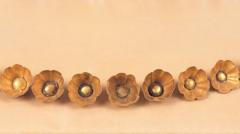Throughout Sudan, conflict has taken a grave toll on cultural heritage, notably at the National Museum of Sudan. Once a vibrant center housing ancient Nubian artefacts and Christian murals, the museum has fallen victim to looting during the ongoing civil war, which has lasted for two years. As fighting between the Sudanese military and the Rapid Support Forces (RSF) subsided in Khartoum, shocking evidence of destruction emerged—shattered glass, bullet casings, and signs of extensive looting echoed throughout the halls that once celebrated the nation's rich history.
Prior to the conflict, the museum welcomed tourists and students, offering a connection to the past. Now, its director, Ikhlas Abdel Latif Ahmed, lamented the loss, reporting that dozens of thousands of artefacts have either been damaged or taken to be sold. Much of the museum’s collection was reportedly boxed up for preservation and thus became an easy target for the looters. Experts speculate that RSF members may have trafficked stolen treasures to countries like the United Arab Emirates.
The international community has expressed alarm over cultural threats in the region, urging art dealers to avoid dealing in any artefacts believed to be looted. While Sudan's government has vowed to seek the return of its national treasures through organizations like Interpol and UNESCO, the recovery process looks perilous and complex. Observers believe the ongoing looting reflects a deliberate attempt by the RSF to erase Sudan’s historical identity, sparking outrage amongst cultural leaders and historians.
With nearly 13 million people displaced and countless lives lost, the enduring struggle of Sudan extends beyond the battlefield. Ahmed expressed determination to rebuild the museum, hopeful that the time will come when Sudan's cultural heritage can be celebrated anew. “Inshallah [God willing], we will get all our collections back,” she affirmed, signaling resilience among Sudanese people even amidst unfathomable challenges.
Prior to the conflict, the museum welcomed tourists and students, offering a connection to the past. Now, its director, Ikhlas Abdel Latif Ahmed, lamented the loss, reporting that dozens of thousands of artefacts have either been damaged or taken to be sold. Much of the museum’s collection was reportedly boxed up for preservation and thus became an easy target for the looters. Experts speculate that RSF members may have trafficked stolen treasures to countries like the United Arab Emirates.
The international community has expressed alarm over cultural threats in the region, urging art dealers to avoid dealing in any artefacts believed to be looted. While Sudan's government has vowed to seek the return of its national treasures through organizations like Interpol and UNESCO, the recovery process looks perilous and complex. Observers believe the ongoing looting reflects a deliberate attempt by the RSF to erase Sudan’s historical identity, sparking outrage amongst cultural leaders and historians.
With nearly 13 million people displaced and countless lives lost, the enduring struggle of Sudan extends beyond the battlefield. Ahmed expressed determination to rebuild the museum, hopeful that the time will come when Sudan's cultural heritage can be celebrated anew. “Inshallah [God willing], we will get all our collections back,” she affirmed, signaling resilience among Sudanese people even amidst unfathomable challenges.






















